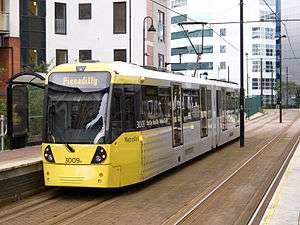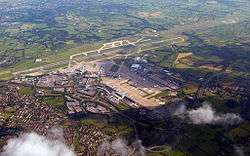Mayor of Greater Manchester
| Mayor of Greater Manchester | |
|---|---|
| Appointer | Electorate of Greater Manchester |
| Term length | 4 years |
| Website | Office of the Interim Mayor |
The Mayor of Greater Manchester is a planned directly elected political post responsible for the strategic government of Greater Manchester, including health, transport, housing, strategic planning, policing and skills. The creation of the Mayor of Greater Manchester has been agreed between the Chancellor of the Exchequer and Greater Manchester's 10 district council leaders, but requires new primary legislation. The Greater Manchester Combined Authority is proposed to continue, but the Greater Manchester Police and Crime Commissioner is expected to be rolled into the new mayoralty. The first election will take place on Thursday 4 May 2017.[1] Tony Lloyd was appointed as Interim Mayor for Greater Manchester on 29 May 2015.[2]
Background
The ten local authorities which make up Greater Manchester work together as the Greater Manchester Combined Authority, which carries out work through bodies including Transport for Greater Manchester and the Greater Manchester Waste Disposal Authority. There is a directly elected Mayor of Salford for the City of Salford. In 2008, Bury rejected a proposal for an elected mayor for the borough only.[3] In 2012, Manchester rejected a similar proposal for the City of Manchester only. There is also a Lord Mayor of Manchester which is a ceremonial post.
Timescale
The proposal for an elected mayor was announced in November 2014 by George Osborne.[4] The creation of an elected mayor for Greater Manchester will require new primary legislation.[5] The first election will take place on Thursday 4 May 2017.[1] On 29 May 2015, Lloyd was appointed as interim mayor by the combined authority leaders.[6] The Labour Party candidate was confirmed as being Andy Burnham on 9 August 2016, fending off Ivan Lewis and Tony Lloyd to the position.[7] The Liberal Democrats candidate was confirmed in September 2016 as Jane Brophy, who is a Trafford Borough councillor.[8]
Powers and functions
Powers of the mayor will initially announced include spatial planning, housing, transport, policing, waste management and skills.[9] In February 2015 control of health spending was announced as a potential additional power.
Spatial planning
There will be a county-wide spatial planning strategy, similar to the London Plan.
Housing
The mayor would oversee the administration of a £300m housing fund with the intention of delivering an additional 15,000 homes over a 10-year period.[10]
Transport


The mayor would gain significant powers over transport in Greater Manchester which is arguably the largest transport-connected area outside London following recent developments. The successful delivery of large infrastructure such as the second runway at the publicly owned Manchester Airport in 1998, the amalgamation of the M60 orbital motorway in 2000 and a rapidly expanding and self-sufficient tram system - from 20 stations in 2009 to 92 stations in 2014 - have emboldened local authorities and instilled confidence at Whitehall.[13] Responsibilities include overseeing road management (transferred to TfGM in 2009) which include road safety, bus lanes and congestion as well as influence over bus services, the Metrolink tram system and cycling schemes.
The mayor will have the ability to franchise bus routes away from central government, a power Transport for Greater Manchester has sought in response to dwindling bus passenger figures. The falling figures in a county where population is increasing contrasts with Greater London where bus patronage has increased with franchise powers. Bus passengers have faced inflation-busting fare increases over the past decade whilst Stagecoach Manchester claim bus journeys take 40% longer in 2013 than in 1993 due to road congestion - which has pushed passengers to alternative forms of transport such as rail, tram and bicycle as well as back into cars.[14]
The vast majority of bus services in Greater Manchester are operated by only two companies; Stagecoach Manchester and First Greater Manchester - the former of which is Stagecoach's largest division. The takeover of smaller bus companies such as Finglands and Bluebird have frustrated TfGM as well as a perceived stubborn attitude towards transport improvements by bus companies - Stagecoach Manchester have consistently questioned transport improvements such as the Metrolink line to Trafford Park with TfGM believing such warnings to be motivated by economic self-interest as well as general warnings about devolution.[15] The chair of TfGM has gone as far to publicly state that bus companies in Greater Manchester need "their monopolies busted open" to implement new ideas, improve punctuality and accountability, increase patronage and provide commuters an improved alternative.[16]
Manchester is also served by the Metrolink tram system. The network, which is now the largest light rail system in the United Kingdom, covers seven of the ten Greater Manchester boroughs. The system has grown at a vast rate since 2009 expanding from 20 stations to 92 stations although the system has been called unreliable under an ambitious expansion programme however patronage and reliability appear to be gradually growing.[17] Under the devolution agreement, £30 million a year will be provided to TfGM over a 30-year period which all but guarantees the construction of £350 million Trafford Park line with construction expected to start in 2016/17.[18]
It is not known if the mayor's mandate will include strategic influence over the Manchester Airports Group, which is partly owned by the people of Greater Manchester, and has an asset value of nearly £4 billion. The Group provides a significant annual dividend to the ten councils of Greater Manchester (usually over £15 million) and is a key player in the aviation industry in the United Kingdom, owning not only Manchester Airport but London Stansted and East Midlands.
Policing
The role of Police and Crime Commissioner for Greater Manchester would be subsumed into the new mayoral post. Turnout in Greater Manchester for election in 2012 was just 14%. The Commissioner currently produces police and crime plans with objectives on reducing specific types of crimes, distributing the £520 million police fund (an annual grant from the Home Office) and has the power to appoint - and if viewed as appropriate - the power to dismiss the Chief Constable of Greater Manchester Police.
Waste management
The mayor will be responsible for the administration of the Greater Manchester Waste Disposal Authority, which is the largest waste disposal authority in the United Kingdom responsible for the waste of 2.7 million people.
Health
In February 2015 it was announced that the mayor could take on some responsibility for the NHS England budget in Greater Manchester.[19] Although it was later reported that distributing funds from the budget "will be the responsibility of the combined authority as a whole" in the words of Howard Bernstein, the apolitical chief executive of Manchester City Council. It is expected the mayor will liaise on the distribution of the health budget along with the ten council leaders of Greater Manchester and the 12 Clinical Commissioning Groups in the region.[20]
Justice
As part of the 2016 UK Budget, it was announced that powers relating to criminal justice would be devolved to the Mayor as part of a drive to offer seamless interventions for offenders transitioning between prisons and the community and also to join up public services that prevent crime. As part of this, there will also be a new 'Life Chances Investment Fund'.[21]
Governance arrangements

Unlike the directly elected London Assembly scrutiny structure that operates in Greater London, the Mayor of Greater Manchester would sit on the Greater Manchester Combined Authority alongside the ten council leaders as the eleventh member. The council leaders will form part of the mayor's cabinet, each with a clear portfolio of responsibilities.[22] The mayor could be vetoed if a majority vote against any proposals put forward, and the spatial planning strategy requires a unanimous vote of the mayor's cabinet.[23] The existing scrutiny arrangement of the Greater Manchester Combined Authority will continue and will be extended to cover the mayor and the new areas of responsibility.
List of Mayors
| Colour key (for political parties) |
|---|
| Name | Picture | Term of office | Elected | Political party | Previous occupations | ||
|---|---|---|---|---|---|---|---|
| Tony Lloyd | |
29 May 2015 | Incumbent | — | Labour | MP for Stretford MP for Manchester Central Greater Manchester Police and Crime Commissioner | |
References
- 1 2 "Date proposed for Manchester mayoral elections". Department for Communities and Local Government. 1 February 2016.
- ↑ McCann, Phil (29 May 2015). "Tony Lloyd selected as Greater Manchester interim mayor". BBC news. Retrieved 31 July 2015.
- ↑ "Bury elected mayor plan rejected". BBC News. 4 July 2008.
- ↑ "George Osborne: Greater Manchester to have elected mayor". BBC News. 3 November 2014.
- ↑ Carpenter, Jamie (3 November 2014). "Manchester metro mayor to get strategic planning powers". PlanningResource.
- ↑ Fitzgerald, Todd (20 December 2014). "Council bosses reject calls for referendum on planned elected mayor for Greater Manchester". Manchester Evening News.
- ↑ "Andy Burnham selected as Labour candidate for Manchester mayor". BBC News. 9 August 2016.
- ↑ "Greater Manchester mayor:Jane Brophy chosen as Lib Dem Candidate". BBC News. 16 September 2016.
- ↑ Topping, Alexandra (3 November 2014). "Manchester to get elected mayor". The Guardian.
- ↑ "Manchester gains control of housing". insidehousing.co.uk. 3 November 2014. Retrieved 9 November 2014.
- ↑ "Which is England's second city? When it comes to public transport, the answer is clear". citymetric.com. 22 October 2014. Retrieved 2015-02-27.
- ↑ "Manchester Airports Group dividend windfall for councils". BBC News. 31 July 2013. Retrieved 2015-02-27.
- ↑ "Manchester Metrolink line opens more than a year ahead of schedule". The Guardian. 2 November 2014. Retrieved 2015-02-26.
- ↑ "Congestion has cost Stagecoach Manchester £6m this year, says bus chief". Manchester Evening News. 22 November 2013. Retrieved 15 November 2014.
- ↑ "Autumn Statement: Stagecoach bus chief in devolution warning". BBC News. 2 December 2014. Retrieved 24 December 2014.
- ↑ "Busting open the bus monopolies". progressonline.org. 21 August 2014. Retrieved 10 November 2014.
- ↑ "Manchester trams 'damaging city's reputation'". BBC News. 24 January 2012. Retrieved 10 November 2014.
- ↑ "Chancellor visits new Metrolink line and unveils ground-breaking Government transport deal". Transport for Greater Manchester. 3 November 2014. Retrieved 10 November 2014.
- ↑ Kirkup, James (26 February 2015). "George Osborne's northern powerplay". The Telegraph. Retrieved 2015-02-26.
- ↑ "Mayor not responsible for devolved health budget". Local Government Chronicle. 4 March 2015. Retrieved 2015-03-05.
- ↑ HM Treasury, "The UK economy and public finances: Devolution", in HM Treasury, Budget 2016 (pdf), London: HMSO, p. 74, ISBN 9781474129572.
- ↑ "Greater Manchester Agreement: devolution to the GCMA & transition to a directly elected mayor" (PDF). Government of the United Kingdom.
- ↑ "Manchester to get directly elected Mayor". Government of the United Kingdom. 3 November 2014.